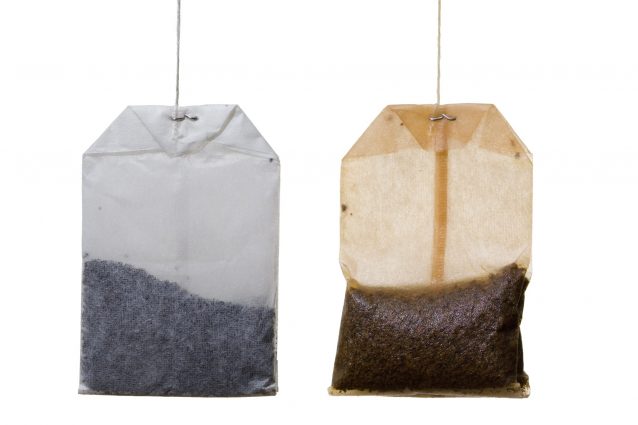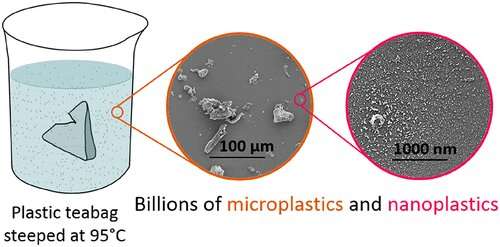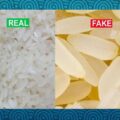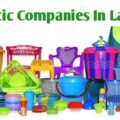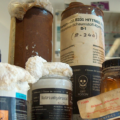A tea bag (or “teabag”) is generally agreed to be a small, porous bag used to steep tea. These bags may be sealed and filled with tea leaves, or they may be open and empty (thus allowing the tea brewer/drinker to fill it with whole-leaf tea). Many tea bags have a string attached to make removing them from the brewing vessel easier, however, this is not true for all teabags. Generally, tea bags with a string attached also bear the name of their producer or the type of tea on a small piece of paper at the opposite end of the string from the teabag itself.
The Origin of Tea Bags
The origin of the tea bag is steeped in legend. Around the turn of the 20th century, a tea importer named Thomas Sullivan is said to have stumbled upon the invention of the teabag quite by accident. Story has it that he, like so many other tea importers of the time, had a habit of shipping samples of his latest imports to potential buyers. At the time, tea was highly prized and very expensive by today’s standards, so the usual container for these samples was a metal tin. Sullivan decided to cut costs one year, sending his samples out in hand-sewn silk muslin bags (which resembled little sacks) instead of the pricier tea tins.
Tea Bags and Plastics
Several tea bag brands use polypropylene, a sealing plastic, to keep their tea bags from falling apart. This plastic is not recyclable or biodegradable. So, even when you put all your used tea bags in the food waste or compost heap, it can lead to plastic pollution, as not all of it will be broken down. This problem is linked to tea bags where the actual bag itself is made out of plastic material, not the paper bags that are more common. These plastic tea bags are more often linked to higher-end brands.
As of September 2019, around 96% of the tea bags used in the UK contain non-biodegradable polypropylene fibers woven into the fabric of the bag, which allows them to be sealed by heat. The scientists found that one plastic tea bag releases around 11.6 billion microplastics and 3.1 billion smaller nanoplastic particles into the cup. The findings were published in the Journal of Environmental Science & Technology.
According to a BBC article, a rundown of the biggest brands is as follows:
Twinings
- Are standard teabags plastic free? The Twinings traditional teabag range contains a small amount of oil-based plastic. From January 2020, the range will become plant-based and will biodegrade in industrial composting. It says some of its “tag” teabags are plastic free – they are made from a plant-based paper material that is folded and stitched with cotton
- How do you dispose of the teabag? The bin
PG Tips
- Are standard tea bags plastic free? PG Tips announced in February 2018 that it was planning to switch to fully biodegradable, plant-based teabags. Its website currently states that it is moving towards “fully biodegradable teabags” and has already produced one billion
- How do you dispose of the teabag? The bin
Yorkshire Tea
- Are standard tea bags plastic free? Yorkshire Tea says it explored many options before deciding the best way to remove oil-based plastic quickly was to use the bio-plastic PLA to seal its bags so that it can continue to make high volumes of tea with its existing set-up in Harrogate. It says in the future it “hopes to go completely plastic free”
- How do you dispose of the teabag? Currently the bin. The new bag will go in the household food bin collected by the council
Tetley
- Are standard teabags plastic free? Tetley says its teabags contain a small amount of plastic material (0.04g per bag) so that they can be heat-sealed. It anticipates beginning to introduce fully biodegradable teabags for its core ranges in 2020. It says its goal is to “eliminate” plastic completely
- How do you dispose of the teabag? The bin
Pukka
- Are standard tea bags plastic free? Its owner, Pukka Herbs, says it doesn’t heat-seal the edges of teabags, instead it uses a simple stitch of organic cotton and what it calls “a unique folding process”. It says this is “a more costly and complex process”. It individually wraps each teabag and it expects all its blends to be in its new recyclable envelope by the end of 2019 (it started rolling it out in May 2018)
- How do you dispose of the teabag? On a home compost – or if you don’t have one, the household food bin collected by the council
Clipper
- Are standard teabags plastic free? Clipper describes the teabag as plastic free, but the bags contain a “renewable, plant-based bio-polymer” – also known as a bio-plastic. It says it is exploring a number of green packaging initiatives, including improving recyclability and reducing packaging weight
- How do you dispose of the teabag? The household food bin collected by the council
Which brand of tea bags does not contain plastic?
According to Implasticfree an organization that helps those who wish to lead an eco-conscious life, the following brands of tea bags do not contain plastic;
- Dilmah Organic: only the organic tea range tea bags are free of plastic.
- Nature’s Cuppa Organic– Eatrite Australasia Pty Ltd (the manufacturer) responded that their tea bags are made with unbleached paper, and no polymers or plasticizers. That makes sense because they are closed with a metal staple.
- Higher Living Teas– Their teabags are made out of unbleached paper with an organic cotton string stitched into the paper to form the teabag, therefore there’s no plastic. The teabag is completely compostable along with their envelope and the boxes are recyclable.
- Pukka– They use a simple stitch of organic cotton and a unique folding process. They don’t need to use polypropylene to hold their teabags together and these are therefore free from plastic. They were the first company to ever use organic strings to hold its teabags together without the need of a metal staple or polypropylene.
- Tetley– They have confirmed their stringed tea bags (pyramid and regular) are plastic free.
- Lipton – Their Quality Black and Intense traditional tea bags are made from Manilla hemp and cellulose fibers. They are compostable but not recyclable.
- Qi Tea– Their tea bags are completely plastic free. They try to keep all their packaging as completely plastic free as possible so it’s 100% recyclable and uses veggie inks so it’s also compostable. The only part that has a little plastic is the envelope wrapper because it helps keep it fresher longer, but they are working on an alternative substrate for that.
- Harney & Sons– “Our paper tea bags are compostable, oxygen bleached with a method that does not produce dioxins, there is no epichlorohydrin, PET, or PLA in our paper teabags. We offer a variety of certified organic teas in them. The teabags are fastened with a knot in the string, there is no glue or staple on the teabag, and they are a great choice if you have any concerns about plastics. READ: Ahamed Tea: Health Benefits and Side Effects

